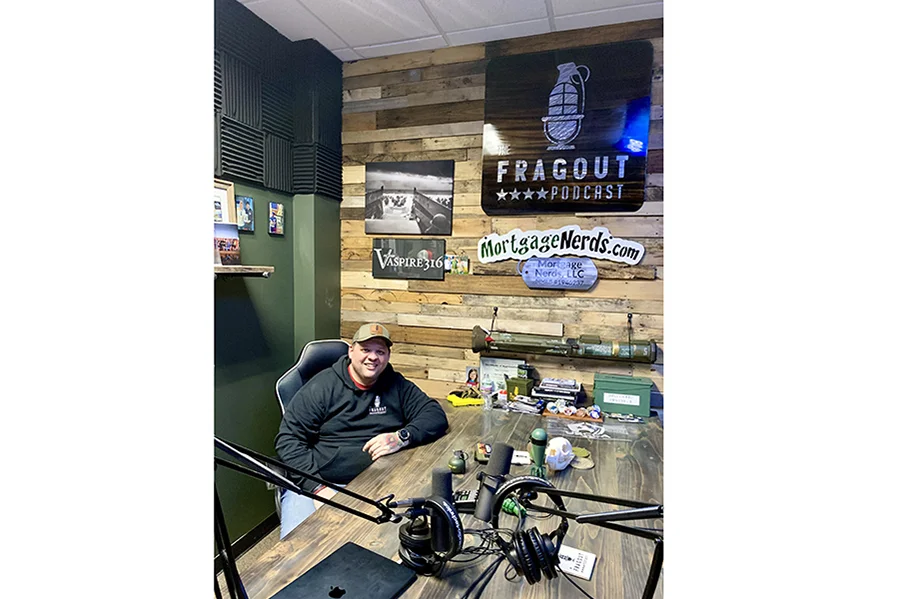
March 5, 2024
APPLETON — By his estimation, Ryan Lonergan said he’s been able to impact the lives of more than 10,000 veterans — and that came before he started his podcast.
“In 2019 alone I helped more than 3,000 veterans, service members and family members,” he said. “I have the spreadsheet still — not too shabby.”
That year, Lonergan said, as part of his job helping veterans become gainfully employed, he needed to track all of his progress for his employer: The Pentagon.
Lonergan, a veteran himself, said he’s always done what he could to help veterans — during and after his own military service, and whether he was paid for it or not.
“I started helping veterans in 2007,” he said. “I was going to the Milwaukee VA, passing out little gift bags of calculators with the big numbers so the old veterans could see the numbers, and shoehorns. Just simple basic needs. And every year I’ve always tried to find a way to elevate that. How can we make this a little better?”
For the past four-plus years, Lonergan said, those efforts have been focused on The Fragout Podcast.
As host, producer and virtually every other role, Lonergan said, he interviews primarily, though not exclusively, veterans.
“I created the podcast to showcase that there are some amazing veterans and people out there — men and women doing epic things after their service,” he said. “My goal is to interview them and listen to their story. That’s all.”
Furthermore, Lonergan said the podcast aims to share those stories with other veterans.
“We have issues in the veteran community,” he said. “But a lot of them are aligned with everyday life. I bring on everyday people (to the podcast) because we all have something to share.”
Those who come on the podcast, Lonergan said, are also impacted.
“I’ve had people who were in the parking lot (after being interviewed on the podcast), and they’ve texted me and said, ‘that was the most therapeutic thing I’ve ever done in my life,'” he said.
And then there’s his audience, which Lonergan said he estimates is 3,000-8,000 listeners a month.
He said he’s built Fragout’s following organically via networking, word of mouth, by providing consistent and authentic content and his willingness to learn new equipment, software and platforms.
“It’s challenging,” he said. “I don’t think people understand how hard podcasting is. I’ve read a lot of articles saying you have to get past episode 20 and you have to have so many downloads and so many followers. Why base your life off a number? If you’re having fun, who gives a rip?”
From rags to Fragout
Lonergan said his dual inclinations — working hard and having fun — go back to his middle-class upbringing in Southeast Wisconsin.
He said his mother raised his brother and him by herself, making chores necessary from an early age.
“We earned everything we had,” he said. “If I needed food, I made my own food. I did my own laundry.”
Meanwhile, Lonergan said, at school he was naturally social.
“I’ve always been a talker and just a goofball,” he said. “In fifth grade I got seven detentions in one month from talking in class. I monetize talking now, so the joke’s on them, right?”
As he got older, Lonergan said he became more aware of his family’s financial situation and what that might mean for his future.
“(My mother) taught us everything she could on a single-parent income, so college was pretty (much) out of the question,” he said. “Early in my senior year, I recognized I should probably go do something different.”
That different path, Lonergan said, would be military service.
“I always wanted to be in the military — always,” he said. “I enlisted April 5, 2006. It was a culmination of patriotism and fulfilling a childhood dream.”
The money he received to enlist, he said, astounded him, as did his assignment.
“They gave me the coolest job in the world,” he said. “I was an infantryman in a reconnaissance, surveillance and target acquisition unit. I was like, ‘I don’t know what any of that means, but that sounds really (great), so sign me the (heck) up.'”
Lonergan said infantry school was “awesome,” and among the “motley crew of individuals” he fit right in.
“I was always trying to build morale, keep people’s spirits up and make people laugh,” he said. “But when it was time to train and do a mission or task, I was like ‘okay, let’s go. We’re not (messing) around here.’ And I always made sure people were good to go.”
Lonergan said he made many close friends during this time, who nicknamed him “Farva” after the character in the comedy “Super Troopers”.
After infantry school, he said he was sent to “a very good national guard unit,” and then to Iraq in 2009-10.
As war raged throughout the Middle East, Lonergan said tragedy loomed.
He said he lost four of his brother-like friends “back to back to back to back” including one friend killed by a roadside bomb in Afghanistan.
“The loss of (my) friends was really too much for me,” he said. “I lost my motivation. I lost my way.”
Lonergan said he had always intended to be a “lifer,” but the cumulative devastation led him to decide to end his military service.
“When everyone in my unit found out I was leaving, they were so shocked,” he said. “They literally thought I was going to be the one person who does 20 years.”
Of his six years in the military, Lonergan said it was “everything I thought it was going to be, and it was everything I didn’t want it to be, at the same time.”
Transitioning back to civilian life, he said, brought with it immense personal challenges.
As he set about utilizing his GI Bill and VA education benefits to enroll in college, he was also navigating a divorce that he said left him “borderline homeless.”
Lonergan said during this exceptionally low period he twice attempted to end his own life.
“I’m an open book, man,” he said. “You put a dime in me, you have to put up with it.”
Lonergan said he intently focused on college, taking his mother’s advice to learn all he could, while he could.
“(This was) the one important time I listened to my mom,” he said. “I went from part-time military to full-time professional student for the next six-and-a-half years or so.”
During that time, Lonergan said he earned two separate associate’s degrees, a bachelor’s degree and came within six credits short of his master’s, he said, needing to instead get his “first big boy job” due to the birth of his daughter.
Lonergan said he has since been employed by the Wisconsin Department of Veteran Affairs, The Pentagon and a nonprofit — working with veterans from all over the state.
Disruptive impact
Lonergan said he became aware of the podcast medium around 2017 — perfect for the extensive commuting his work required — and began listening to shows, such as Drinkin’ Bros, Team Never Quit and The Joe Rogan Experience.
After two years of enjoying the medium and its open-ended, conversational engagement, Lonergan said he was inspired to personally try hosting.
“I started the podcast Oct. 15, 2019 from my kitchen table — I was like, ‘alright, my turn,'” he said. “I took a little bit of what I liked about everybody and just made my own deal. And I realized there’s nobody in Wisconsin doing what I’m doing, and there still hasn’t been.”

Ryan Lonergan said guests of The Fragout Podcast autograph the walls of his studio at the Mortgage Nerds office in Appleton. Submitted Photo
Lonergan said the hard part was teaching himself how to produce the podcast.
The easy parts, he said, were:
Deciding what to talk about — beneficial information for veterans, as well as motivational and entertaining storiesWho to interview ≠ñ the seemingly endless veterans and service members he’d met through the years
“I would say 70-80% of the people I personally know, and then 20% are people who have been referred to me, or they reach out,” he said.
Lonergan said he named it The Fragout Podcast as a reference to the fragmentation grenades used by the military.
“When you throw a grenade you yell, ‘frag out’ — kind of like when you chop a tree down, you yell ‘timber,'” he said. “It’s just a safety word. It’s so personal to throw a grenade. If you throw a grenade, the enemy is within five to 15 meters. That’s really close. So, if I’m going to tell a story, we’re just going to ‘frag out,’ tell a story and be personal, with the idea to hopefully impact somebody’s life.”
Four years into hosting The Fragout Podcast, Lonergan said he’s published more than 200 episodes.
He said his guests have been primarily veterans — “everyday people with extraordinary stories” — but he’s also featured higher profile guests including comedian Brendan Schaub and Tom Farley, older brother of the late actor Chris.
In the time since he started the podcast, Lonergan said he has been recognized with a number of honors, including Concerned Veterans for America’s 2020 Veteran Social Entrepreneur of the Year, the 2021 Northeast Wisconsin Veteran of the Year and the Fox Cities Chamber of Commerce’s Young Professional of the Year for 2022.
He said he’s also been able to partner with a number of companies and institutions, such as Black Rifle Coffee Company, the United States Concealed Carry Association and Fox Valley Technical College.
Lonergan said perhaps his most important sponsorship is from Appleton broker Mortgage Nerds, who Lonergan said offered him an office to convert to his current podcast studio.
Such resounding encouragement, he said, has allowed for The Fragout Podcast’s listenership to spread across all 50 states and more than 30 countries.
Lonergan said he wants to reach “anybody who wants to learn something about veterans or the unique people we have here in the State of Wisconsin.”
“The mission of the podcast is to provide knowledge and information, and to set an example for others to live by,” he said. “Tell stories, have fun, make people laugh. Share really good veteran information, and just give hope to some veterans out there. That’s about it. Honor my friends, and have some fun while doing it.”
Lonergan said his desire to share information about how veterans can utilize the benefits they’ve earned stems from his own difficulties and discouragement from navigating the system in 2012 — issues he said continue to plague veterans.
“Where do I get my benefits? Who’s going to help me with a resume? Where am I going to get a job? Who’s going to tell me about my VA education benefits? My VA health care? Everything that encompasses transitioning out of the military,” he said. “The same way it was 12 years ago, it’s the same way in 2024. And the worst part about it is we have all this technology, and people still are having problems with it.”
Lonergan said he describes this complicated struggle as veterans’ and service members’ “new war” — one against bureaucracies, red tape and access to reliable information.
This is why the greatest reward from doing The Fragout Podcast, he said, is helping his friends — fellow veterans — and watching them succeed.
One example, Lonergan said, is being able to direct veterans where to go to get their discharge paperwork — something he said is “real simple stuff,” but can impact home loan eligibility.
“Veterans are killing themselves for less,” he said. “That’s why I started the podcast.”
Lonergan said he uses his podcast as a platform for such knowledge transfers.
The overarching goal, he said, is to produce content that will be atypical and genuine, garnering attention or even alarm for the sake of alleviating veterans’ struggles.
Lonergan said he calls this strategy “disruptive impact,” which sees him leveraging his unique combination of experience, credibility, audience and partnerships to bypass bureaucracy and serve veterans in ways other organizations never could.
“The reason so many companies support me is because I’m an independent source, in the sense that I have so much experience helping veterans,” he said. “I don’t have to ask permission to help veterans. I don’t have to go to a board to get approval. I don’t have to get votes — I can just go and do things. So, I can be disruptive — podcasts, videos… I can do whatever I want, and make an impact at the same time.”
Lonergan said this also extends to helping to organize numerous charitable events throughout the year — a way for him to follow through on real action.
“I just go to companies and say, ‘hey, this veteran needs $500,'” he said. “‘Okay, Ryan. Here you go.’ Done. And they trust me, because I have all of the credentials and the background. Not many veteran advocates in Wisconsin worked for the Pentagon. I know what I’m doing, and I’m state and nationally certified for VA claims, too. What else do you need?”
Lonergan said he would love to get to a point where he could focus on The Fragout Podcast full-time, particularly as he said it becomes “more than a podcast.”
For now, he said he’d just love to continue to get more veterans on the show.
This includes, he said, a Wisconsin veteran who lost his arm serving in Iraq who is a seven-time world champion log roller.
Lonergan said his other present dream interview is one of Wisconsin’s most beloved veterans: Milwaukee Brewers broadcaster Bob Uecker.
The Fragout Podcast is available on all major platforms, he said, such as Apple Music, Spotify, iHeartRadio and Amazon Music, as well as many minor ones.
“If you want to cry, listen to episode 104,” he said. “If you want to laugh, listen to the one with Tom Farley. If you want to learn about veterans, listen to all the rest of them.”
Visit FragoutPodcast.com for more information about the show and upcoming events.
 A shining ‘Star’ of restoration and community philanthropy
A shining ‘Star’ of restoration and community philanthropy World Snowshoe Championships coming to Ariens Nordic Center in Brillion
World Snowshoe Championships coming to Ariens Nordic Center in Brillion







